Women at the forefront of AI present their work at the Summit 2024
The WAI Summit 2024 saw the spotlight being turned onto the women making waves in AI, whether studying or working in the field. As done so at 2023’s Summit last year, the event was hosted at Equals in Amsterdam on 15 November 2024 – and what a success it was!
Here’s our recap on everything you would not want to miss from our gathering of some of the most influential women trailblazing AI to transform the scene right now.
Authors: Bianca Dybala, Johanna Mvumbi, Andreia Correia.
AI Young Professional Panel
One of the biggest questions to the young professional women within AI is what truly inspired them to do the work that they do. For nominee Nienke Bakk, a challenge and solution mindset was at the crux of it all. Nienke opened up the floor by touching on the fact that while AI was booming years ago, it was then seen that AI could really help to make a real world impact in various fields. For this to be achieved, a lot of communication is needed along the way to catch people up and take them on a journey. With this, it becomes more of a team and not such an ‘individual’ driven sentiment she added.
Starting off in computer science, this then led to a career within AI where Nienke collected data from human data. From the progression of cancer in patients, to cancer response to treatment and prognosis, to discovering drugs as a solution – AI buckled up for this journey. When working with biological data, the main challenge was how to integrate computer science within medicine.
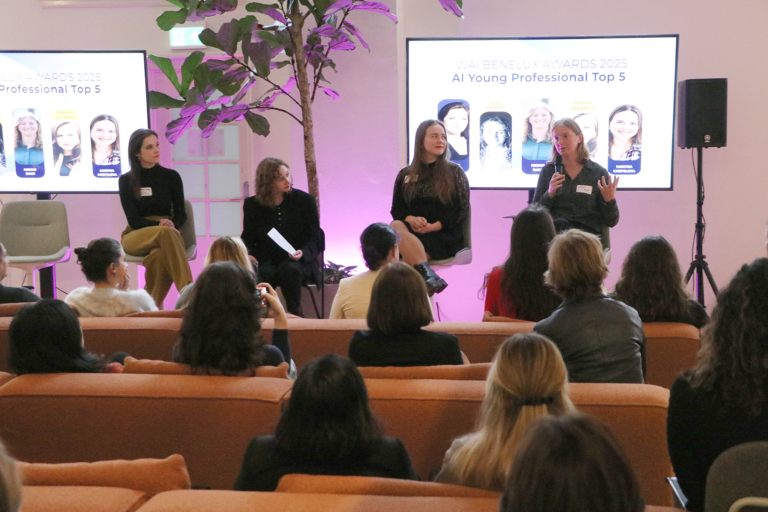
When asked why pursue a career in AI, nominee Anouk Dutrée who started off in nanobiology, recapped how she found the unmatched use of AI. Sparking when she was tasked to create a breast cancer classifier model, this intrigued Anouk as it could be done with a few lines of code. Through the support of her team, Anouk then switched roles and scaled herself to take on greater roles and tackle sexism in the industry. With an external face and role, huge sexism is experienced. She added that it is manageable through internal support as well as industry wide support to truly make a difference.
Our nominees were then asked how more encouragement can be generated for more women to pursue careers in AI. Maryna Chepeleva and Nienke Bakk reflected how there needs to be more fair opportunities, less gender bias and better inclusion overall.
The focus of this section was all about the current sentiment within AI and the forecasts for the future. Getting to take in the dialogue of shared experience and conversation across a variety of industries implementing AI was very informative. In short, the general shared sentiment of AI’s value came in with the speeding up of processes and shortening of the time it takes to find answers and solutions.
Another unanimous point between all three nominees was the pipeline, scaling, implementation and practical use of AI across a variety of different fields. From medicine to agriculture, AI has integrated itself across fields, projects and cases globally. With a direct impact made to real world issues that need solutions, AI helps present more answers than questions. In one case the implementation of AI drone usage called for the changing of pesticides used in crops. In turn, this led to more focused and localized dosage that actually yielded more crops and furthermore, word spread from farmer to farmer within the Netherlands to implement this change.
In many cases of medicine, AI helps automate all the steps within a treatment process. Integrating AI helps doctors perform more intricate tasks such as isolating the treatment site in CT scans and calculating the most accurate dosage of treatment to a cancer site to not affect the other organs. Across the board, one of the biggest takeaways from our AI young professionals was to learn from other fields that have used AI and implement it where applicable in other fields
While nominees Elze Swinkels and Georgina Lara Booth were not at the summit in person, their contributions were acknowledged and included. How awe-inspiring to hear from the very women making changes in the world of AI at our WAI Summit!
AI Researcher Presentations
The next section of the summit navigated various presentations from women within the AI researchers catagory making a difference on the scene. Here we gained further understanding and knowledge of the type of research being conducted and how it is impacting the future of AI.
Judith Dijk
Specialising in autonomous systems, Judith’s research navigates finding more efficient and effective operations. The aim is to have as little human involvement as possible, however this presents its own set of challenges. Here, issues can arise with potential collaboration with humans and issues in recognizing the context. This is where the need for Gen AI comes in as there are certain unspoken rules for robots as, naturally, they don’t understand this concept.
Flor de Guadalupe Ortiz Gomez
Pioneering AI in satellite communications, Flor aims to shape the future of AI in space technology with research specialising in high quality of service provided at any place and any time. Advancing AI in non-terrestrial networks (NTNs), her key areas of focus are energy-efficient operations, real-time adaptability and resource optimization. In combination, these all add to finding innovative solutions for a sustainable future. Flor’s contribution shows that neuromorphic computing and ML can enable more efficient, sustainable and adaptive for autonomous satellite operations.
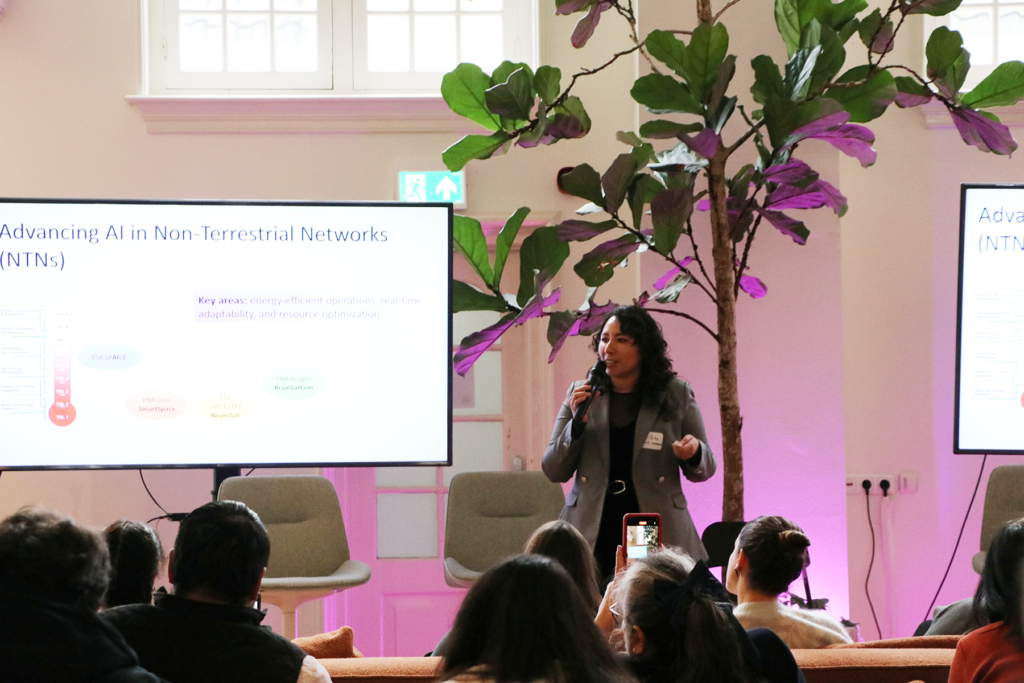
Gergana Velikova
Jumping back to biological implementations of AI, Gergana’s research and interests include biological applications, physical applications, and model training and optimization. Here, her main focus is how to use epigenetic information to study cancer and potentially predict gene interactions. Researching the intricacies of physics-motivated Deep Learning models and Quantum Machine Learning, Gergana is setting the stage for upcoming, unprecedented findings.
Ons Aouedi
Dr. Ons Aouedi is a research associate specialising in the revolutionizing of network service with Next-Gen AI. Her research interests include machine/deep learning, cybersecurity, federated learning and green AI. Dr. Aouedi’s research adds to the greater good as it is driven by an AI-enabled network traffic analysis that aims to mitigate privacy concerns and server damage on devices that have limited computational capabilities.
Sara Colombo
Shifting the focus onto Feminist AI, Sara’s research looks at how to build ethical, inclusive and empowering AI systems. Whilst AI holds the powers to transform, on the flip side it also creates issues of inequality within the field. Sara looks at how we build these systems whilst embracing feminist theories and methods. This also opened up a discussion of ethics and risks as the discussion of ongoing research unfolded.
With such riveting AI researcher presentations shown and discussed, this section of the summit was extremely informative and eye-opening into the capabilities, limitations and potential of AI research currently underway.
AI Diversity Leader Panel
The AI Diversity Leader Award celebrates women who are transforming the AI landscape by making it more diverse, equitable, and inclusive. It honors technology leaders who have significantly contributed to improving AI for underrepresented and marginalized groups. This award’s nominees are not only breaking barriers but also building equitable solutions to create lasting change within the AI ecosystem.
Cristina Zaga opened the panel by shedding light on the unintended consequences AI can have on marginalized communities. As an Assistant Professor at the University of Twente’s DesignLab, Cristina combines her academic expertise with a commitment to justice, equity, and care. Through her collaborations with underrepresented communities, she develops AI tools that address societal challenges and foster inclusion. During the panel, Cristina emphasized that “Every technology is a form of power — it cannot be just for some; it must benefit all.”
Alongside her role as Head of Data and Automation at Swift, Yami Shimrah is fighting to achieve global health equity. Her journey began with a personal health crisis, which revealed systematic gaps in care for women. Motivated by her research across different regions, she combines her passion for workforce health and wellness with innovative, inclusive strategies to dismantle the shame, misdiagnosis, and disparities women face in healthcare. Drawing on her expertise as a certified yoga teacher, nutrition coach, and confidential work counselor, Yami is currently leading a transformative wellness solution developed during her EMBA project at INSEAD.
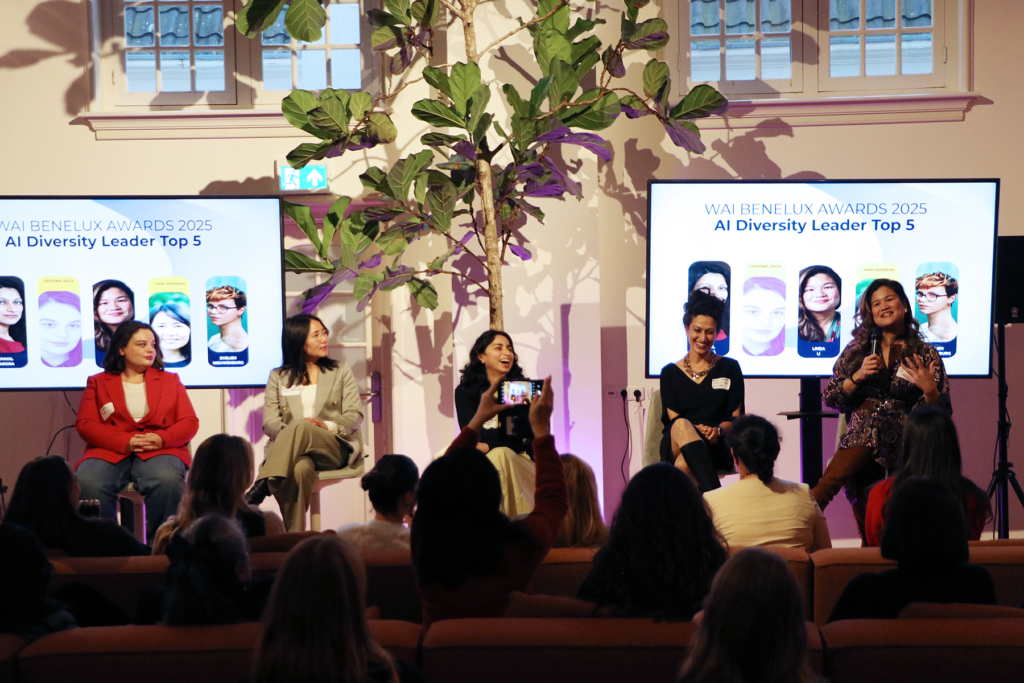
Payal Arora, Professor of Inclusive AI Cultures at the University of Utrecht, underscored the need for AI to serve the majority — those in the Global South. “We need changemakers from within,” she urged, emphasizing the importance of diverse data sets that disrupt traditional AI paradigms and drive transformative progress. Payal founded the Inclusive AI Lab and FemLab to empower women in the Global South, collaborating with companies such as Adobe and Google. Her advice for the crowd: “Women should be able to collaborate with each other better. It starts with us, and then it moves forward!”
Linda Li, a former police officer turned Responsible Data and Algorithms Advisor at the Dutch Ministry of Justice and Security (as well as former Responsible AI Leader nominee), shared her vision of organizational justice and community-building. Fueled by her desire to create a better future for her daughter, Linda founded Lentelotus Consultancy – a company making the world more aware of the difference between men and women caused by nature, nurture and culture and giving advice on how to stop gender inequality. Her main goal is justice, stating that “We shouldn’t have to wait 50 years for the gender gap to close.”
The panelists’ reflections were both moving and empowering, offering advice to women navigating the challenges of the AI industry. From community building to embracing collaboration, their messages highlighted the power of collective action and shared purpose.
AI Sustainability Leader Presentations
The AI Sustainability Leader Award recognizes women making a sustainable impact with AI technology by addressing its long-term consequences. The nominees for this award – Eva Memmel, Arlette van Wissen, Lola Botman, Inge van den Ende, and Anitha –, demonstrated how innovative AI systems can contribute to positive environmental outcomes.
Eva Memmel, a PhD candidate at the University of Delft, opened the discussion by emphasizing the need for a holistic portfolio approach to sustainable AI. She highlighted that sustainability in AI extends beyond reducing its environmental footprint to also addressing its social and economic impacts. Eva is currently researching innovative ways to make Artificial Intelligence for Big Data more sustainable. Her work applies advanced tensor methods to tackle high-dimensional and large-scale data problems in machine learning and system identification.
A member of the Advisory Committee Analytics of the Dutch Ministry of Justice and a Senior AI Scientist at Philips Healthcare, Arlette van Wissen highlighted the dual challenge of AI adoption in healthcare and its sustainability implications. While AI has the potential to revolutionize patient care, the energy demands of data centers and other technologies pose significant environmental concerns. Arlette’s work focuses on developing an international code of conduct for AI in healthcare, aiming to establish sustainable practices across the industry.
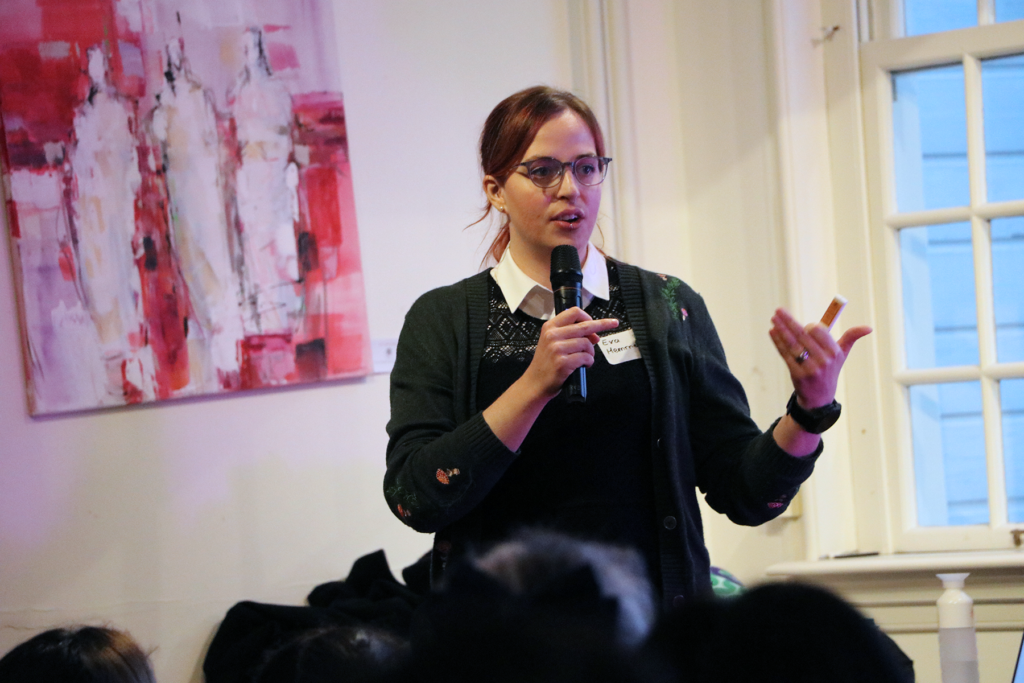
Lola Botman, a post-doctoral researcher at KU Leuven, presented her groundbreaking forecasting method – developed to address the challenges of ensuring reliable electricity distribution on the low-voltage grid in the face of increasing demands from solar panels and EVs. Her innovative global forecasting method leverages smart meter data to optimize resource allocation, making the low-voltage grid smarter and more adaptive.
Inge van den Ende, a Data Scientist at Dexter, showcased her innovative work in creating AI forecasts that strike a balance between precision and energy efficiency, emphasizing the importance of responsible technology development. Closing her presentation on an inspiring note, Inge reminded the audience of the importance of self-belief and the incredible potential each individual holds to make a difference.
The session underscored the urgency of prioritizing sustainability in AI, with nominees demonstrating that innovation and environmental stewardship can go hand in hand.
Bridging Innovation and Responsibility
Building on earlier discussions on diversity, sustainability, and innovation in AI, the final stretch of the summit brought everything full circle, by finally honing in on the critical interplay between innovating and the responsibility it brings with it in technology. This last part kicked off with the introduction of the AI Entrepreneur category nominees, followed by the Responsible AI Leaders panel featuring Judith Zoe Blijden, Sterre Romkema, and Caroline VandenPlas.
Entrepreneurs like Dzer Kayati, co-founder of Mind, captivated audiences with their visionary goals to bridge neuroscience research with practical AI applications. By leveraging neuroadaptive AI, Kayati’s platform measures, detects, and predicts human emotions to personalize experiences, such as playing relevant music or adjusting environmental conditions. What began as an app evolved into a larger vision of creating a transformative platform to improve global wellbeing—an ambitious leap toward making neuroscience accessible and actionable in everyday life.
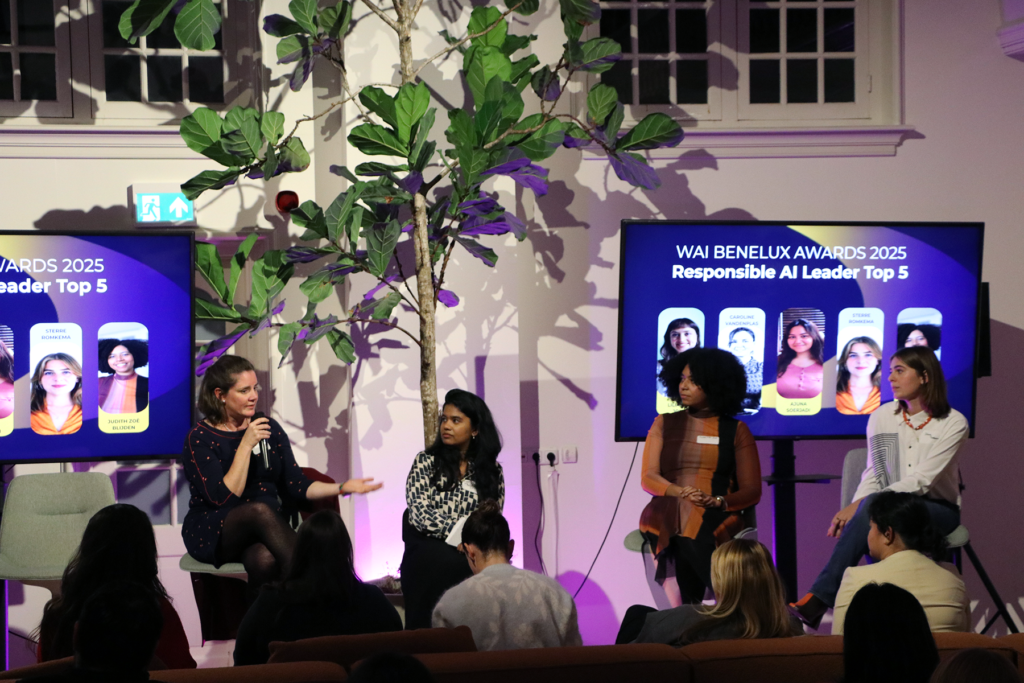
Estefania Hernandez, founder of EVERday, has dedicated a decade to empowering individuals to upskill and close career gaps. Her platform addresses the challenge of automating the upskilling process while eliminating bias, ensuring both employees and companies thrive. By providing tools to maximize potential and close critical skill gaps, she is redefining how organizations and individuals approach career development. Estefania’s work exemplifies the intersection of technology and human potential, emphasizing the importance of equitable access to resources for professional growth.
Healthcare innovation took center stage with Samin Bayat’s Ismile platform, which tackles one of the most pressing challenges in global medicine: the rapid diagnosis of stroke. By prioritizing accessibility and leveraging advanced AI diagnostics, Ismile is paving the way for faster, more effective healthcare solutions. Bayat’s work highlights the life-saving potential of technology when applied to critical areas of need, emphasizing that healthcare is not just a service but a fundamental right.
After these inspiring and bold founders, the Responsible AI Panel shifted the focus to the ethical challenges of AI innovation. On this panel, industry thought leaders explored the ethical considerations that must guide AI development. Caroline VandenPlas stressed the importance of embedding a culture of responsible AI from the outset, focusing on frameworks for testing, monitoring, and assessing all of these implications: “A framework for testing and monitoring is essential—not as an afterthought, but as a core part of the process.”
Judith Zoe Blijden, a lawyer and philosopher, offered a compelling perspective on autonomy and human rights, drawing attention to the intersection of AI and feminist principles.
“Responsible AI isn’t just about systems—it’s about ethics, feminism, and ensuring human rights remain central.”
Her advocacy for engaging diverse voices—developers, ethicists, and philosophers—was echoed by Sterre Romkema, who emphasized the need for long-term monitoring and ethical reassessment of AI systems. Romkema’s insights into government strategies for responsible AI further highlight the need for transparency, adaptability, and inclusion of domain experts. “The Government plays a vital role in making responsible AI visible, but the guidance must evolve over time with proper monitoring and readaptation.”
As the summit drew to a close, we were all left with a powerful message: advancing technology requires a harmonious balance between innovation and ethical responsibility. Whether in healthcare, career development, or the governance of AI, the challenge ahead is to ensure that advancements serve humanity while creating and upholding ethical and inclusive practices. The leaders and innovators showcased during the event the transformative power of technology, proving that when paired with thoughtful stewardship, it has the potential to shape a better, more equitable world.
Celebrate Women Shaping the Future of AI at the Women in AI Gala!
Join us on February 7th 2025 at ING Cedar in Amsterdam for the Women in AI Benelux Awards Gala. This event celebrates the incredible achievements of women driving innovation and diversity in AI across the Benelux region.
Come celebrate trailblazing women, enjoy networking opportunities, and be inspired by stories of impact and success in AI. This is your chance to connect with leaders shaping the future of technology and innovation.
For more information, have a look at our Gala webpage.
Let’s honor the brilliance and resilience of women in AI together!